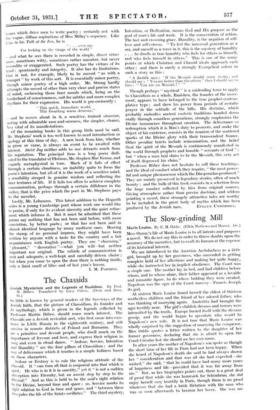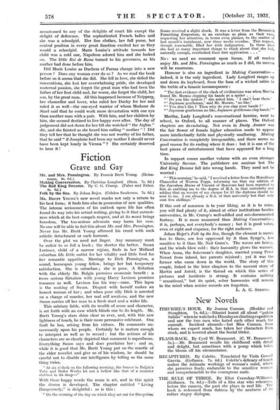The Slow-grinding Mill
Miss ODDIE'S life of Marie Louise is to all intents and purposes a novel. We do not say this in order to throw doubts upon the accuracy of the narrative, but to exalt its human at the expense of its historical interest.
We axe introduced to the Austrian Archduchess as a little girl, brought up by her governess, who succeeded in getting complete hold of her affections and making her quite happy, while she instructed her in implicit obedience. The Court was a simple one. The mother lay in bed, and had children before whom, and to whom alone, their father appeared as a lovable and romantic figure, to do whose bidding they were created. Napoleon was the ogre of the Court nurseryFraneis Joseph its god.
At sixteen Marie Louise found herself the eldest of thirteen motherless children and the friend of her adored father, who was thinking of marrying again. Austerlitz had brought the ogre terribly near. The girl's childish dreams and terrors were intensified by the truth. Europe busied itself with the divorce gossip, and the world began to speculate who would be Napoleon's new wife. It is not true that Marie Louise was wholly surprised by the suggestion of marrying the conqueror. Miss Oddie quotes a letter written to the daughter of her former governess, declaring that she is afraid to open the Court Circular lest she should see her own name.
In after years the mother of Napoleon's son spoke as though the short time of her life in Paris had not been happy. When she heard of Napoleon's death she said he had always shown her " consideration and that was all she had expected—she wished," she said, " that he could have had many more years of happiness and life—provided that it was far away from me." But, as her biographer points out, there is a great deal of proof that while she was homesick for Schonbrun, she did enjoy herself very, heartily in Paris, though there is no proof Whatever that she had a brisk flirtation with the man who .was so soon afterwards to become her lover. She was un- accustomed to any of the delights of court life except the delight of deference. The sophisticated French ladies said she was a schoolgirl. Her fine clothes, her full purse, her central position in every great function excited her as they would a schoolgirl. Marie Louise's attitude towards her child was a cold one, Napoleon adored him and she looked on. The little Roi de Rome turned to his governess, as his mother had done before him.
Did Marie Louise as Duchess of Parma change into a new person ? Does any woman ever do so ? As we read the book before us it seems that she did. She fell in love, she defied the Conventions, she lost her overwhelming pride, she developed maternal passion, she forgot the great man who had been the father of her first child and, far worse, she forgot the child, her son, by the great man. All this happened because of Neipperg, her chancellor and lover, who ruled her Duchy for her and ruled it so well—the one-eyed warrior of whom Madame de Steel said that he could work more devastation with one eye than another man with a pair. With him, and her children by him, she seemed destined to live happy ever after. The day of judgement did not dawn for her till she watched " the Aiglon " die, and she fainted as she heard him calling " mother " ! Did they tell her that he thought she was not worthy of his father, that he said " if Josephine had been my mother I should never have been kept lonely in Vienna " ? She certainly deserved to hear it







































 Previous page
Previous page